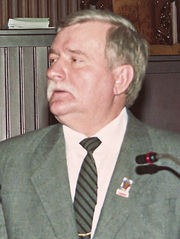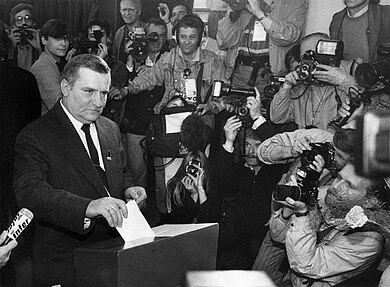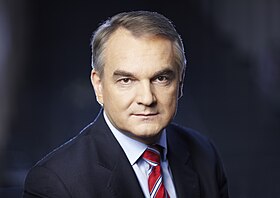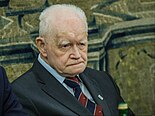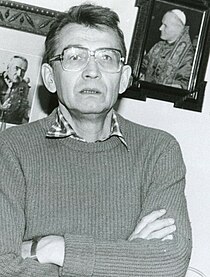User:Polish kurd/sandbox
Candidate selection[edit]
Social Democracy of the Republic of Poland[edit]
| Aleksander Kwaśniewski | |||||||||||||||||||||||||||||
|---|---|---|---|---|---|---|---|---|---|---|---|---|---|---|---|---|---|---|---|---|---|---|---|---|---|---|---|---|---|
| Member of the Sejm (1989-2005) | |||||||||||||||||||||||||||||
| Potential candidates | ||||||||||
|---|---|---|---|---|---|---|---|---|---|---|
| Aleksander Kwaśniewski | Józef Oleksy | |||||||||
| Chairman of Social Democracy (1990-1995) |
Prime Minister of Poland (1995-1996) | |||||||||
During SdRP's Congress on 13 May, Kwaśniewski secured his party's endorsement for President with 296 out of 300 votes. Some delegates believed Józef Oleksy should become the candidate instead.[1][2]
Nonpartisan Bloc for Support of Reforms[edit]
| Lech Wałęsa | |||||||||||||||||||||||||||||
|---|---|---|---|---|---|---|---|---|---|---|---|---|---|---|---|---|---|---|---|---|---|---|---|---|---|---|---|---|---|
| President of Poland (1990-1995) | |||||||||||||||||||||||||||||
| Potential candidates | ||||||||||
|---|---|---|---|---|---|---|---|---|---|---|
| Lech Wałęsa | Tadeusz Mazowiecki | Andrzej Stelmachowski | ||||||||
| Chairman of Solidarity (1980-1991) |
Prime Minister of Poland (1989-1991) |
Marshal of the Senate (1989-1991) | ||||||||
The conflict between Wałęsa and Mazowiecki grew irrenconcilable by late 1990. After several failed attempts at reconciliation and political clashes over positions in the Solidarity movement and trade union, the final attempts at finding a compromise for the presidential election were organized by clergy of the Catholic Church. One was held on 7 July, another on 31 August, where Mazowiecki tried and failed to convince Wałęsa to abandon his presidential ambitions, even promising to field a compromise candidate (presumably Senate Marshal Andrzej Stelmachowski). A last chance at conciliation took place on 18 September, during a meeting with Primate Józef Glemp. Ultimately, the two adversaries from Solidarity ran opposing campaigns - Wałęsa was endorsed by the Centre Agreement, and Mazowiecki by the Citizens' Movement for Democratic Action and Forum of the Democratic Right. The Solidarity movement mostly sided with Wałesa during the election[1].
Freedom Union[edit]
| Jacek Kuroń | |||||||||||||||||||||||||||||
|---|---|---|---|---|---|---|---|---|---|---|---|---|---|---|---|---|---|---|---|---|---|---|---|---|---|---|---|---|---|
| Member of the Sejm (1989-1993) | |||||||||||||||||||||||||||||
| Potential candidates | ||||||||||
|---|---|---|---|---|---|---|---|---|---|---|
| Jacek Kuroń | Janusz Onyszkiewicz | Hanna Suchocka | ||||||||
| Minister of Labour and Social Policy (1992-1993) |
Minister of National Defence (1992-1993) |
Prime Minister of Poland (1992-1993) | ||||||||
During the 2nd Congress of the Freedom Union, three candidates decided to enter the party's candidate selection process: Jacek Kuroń, Janusz Onyszkiewicz and Hanna Suchocka. Suchocka, despite being the highest-ranking of the former three candidates, came last in the first round. The second round of voting saw Kuroń defeat Onyszkiewicz by a slight margin of 11 votes, and the former Minister of Labour became the party's official candidate for President.[1]
Movement for the Republic[edit]
| Jan Olszewski | |||||||||||||||||||||||||||||
|---|---|---|---|---|---|---|---|---|---|---|---|---|---|---|---|---|---|---|---|---|---|---|---|---|---|---|---|---|---|
| Prime Minister of Poland (1991-1992) | |||||||||||||||||||||||||||||
| Potential candidates | ||||||||||
|---|---|---|---|---|---|---|---|---|---|---|
| Jan Olszewski | Lech Wałęsa | |||||||||
| Prime Minister of Poland (1991-1992) |
Chairman of Solidarity (1980-1991) | |||||||||
In August 1990, the KPN was split, with ~300 of its ~1500 members seceding, forming the Confederation of Independent Poland – Democratic Faction (Polish: Konfederacja Polski Niepodległej – Frakcja Demokratyczna, KPN-FD), accusing KPN's leader Leszek Moczulski of authoritarian rule over the party. When elections were called, whereas KPN-FD endorsed Wałęsa outright, KPN offered to endorse Wałęsa, on several conditions: for Wałesa to support an instant resignation of President Jaruzelski, immediate withdrawal of the Soviet Army from Poland and condemn the Balcerowicz Plan. Ultimately, with Wałęsa not fitting the conditions, Leszek Moczulski decided to himself run in the election[3]. With 111 thousand out of 100 thousand required signatures, he managed to pass the threshold to run.[1]
Polish People's Party[edit]
| Waldemar Pawlak | |||||||||||||||||||||||||||||
|---|---|---|---|---|---|---|---|---|---|---|---|---|---|---|---|---|---|---|---|---|---|---|---|---|---|---|---|---|---|
| Member of the Sejm (1989-1993) | |||||||||||||||||||||||||||||
| Potential candidates | ||||||||||
|---|---|---|---|---|---|---|---|---|---|---|
| Waldemar Pawlak | Józef Zych | |||||||||
| Member of the Sejm (1989-1993) |
Member of the Sejm (1989-2015) | |||||||||
On 10 October, the Supreme Executive Committee of PSL declared the candidacy of party chairman Roman Bartoszcze. However, Bartoszcze, as an anti-communist oppositionist, was disliked by the postcommunist ex-ZSL wing of the party. As such, the parliamentary club of PSL, which was seated mostly by members from the ZSL wing, declared ZSL activist Józef Zych's candidacy on 11 October. The next day, the crisis was resolved, as the Supreme Council of PSL confirmed Bartoszcze's candidacy, which believed that voters would be much more likely to support a candidate which did not derive from the communist establishment.[1]
Convent of St. Catherine[edit]
| Hanna Gronkiewcz-Waltz | |||||||||||||||||||||||||||||
|---|---|---|---|---|---|---|---|---|---|---|---|---|---|---|---|---|---|---|---|---|---|---|---|---|---|---|---|---|---|
| President of the National Bank (1992-2001) | |||||||||||||||||||||||||||||
| Potential candidates | ||||||||||
|---|---|---|---|---|---|---|---|---|---|---|
| Hanna Gronkiewicz-Waltz | Leszek Moczulski | Jan Olszewski | Adam Strzembosz | Henryk Bąk | Wojciech Ziembiński | Roman Ciesielski | Jan Parys | |||
| President of the National Bank of Poland (1992-2001) |
Member of the Sejm (1993-1997) |
Prime Minister of Poland (1991-1992) |
Chairman of the Supreme Court of Poland (1990-1998) |
Deputy Marshal of the Sejm (1991-1993) |
Anti-communist oppositionist | Member of the Senat (1989-1991) |
Minister of National Defence (1991-1992) | |||
In August 1990, the KPN was split, with ~300 of its ~1500 members seceding, forming the Confederation of Independent Poland – Democratic Faction (Polish: Konfederacja Polski Niepodległej – Frakcja Demokratyczna, KPN-FD), accusing KPN's leader Leszek Moczulski of authoritarian rule over the party. When elections were called, whereas KPN-FD endorsed Wałęsa outright, KPN offered to endorse Wałęsa, on several conditions: for Wałesa to support an instant resignation of President Jaruzelski, immediate withdrawal of the Soviet Army from Poland and condemn the Balcerowicz Plan. Ultimately, with Wałęsa not fitting the conditions, Leszek Moczulski decided to himself run in the election[3]. With 111 thousand out of 100 thousand required signatures, he managed to pass the threshold to run.[1]
Other candidates[edit]
| Tadeusz Zieliński | Janusz Korwin-Mikke | Andrzej Lepper | Jan Pietrzak | Tadeusz Koźluk | Kazimierz Piotrowicz | Leszek Bubel |
|---|---|---|---|---|---|---|
| Ombudsman in Poland (1992-1996) |
Member of the Sejm (1991-1993) |
Agriculturist | Satirist | Lawyer | Entrepreneur | Member of the Sejm (1991-1993) |
Withdrawn candidates[edit]
| Lech Kaczyński | Marek Markiewicz | Leszek Moczulski | Bogdan Pawłowski |
|---|---|---|---|
| Member of the Sejm (1991-1993) |
Chairman of KRRiT (1993-1994) |
Member of the Sejm (1993-1997) |
Entrepreneur |
| Endorsed Jan Olszewski | Endorsed Lech Wałęsa | Endorsed Lech Wałęsa | Endorsed Lech Wałęsa |
Rejected candidates[edit]
The following candidates registered to run, but failed to cross the threshold of 100,000 signatures required to run in the election:
- Bolesław Tejkowski (Chairman of the Polish National Community)
Notes[edit]
References[edit]
- ^ a b c d e f Cite error: The named reference
Dudekwas invoked but never defined (see the help page). - ^ Woliński, Przemysław. Transformacja Sojuszu Lewicy Demokratycznej – od koalicji wyborczej do partii politycznej.
- ^ a b Cite error: The named reference
Szycwas invoked but never defined (see the help page).





